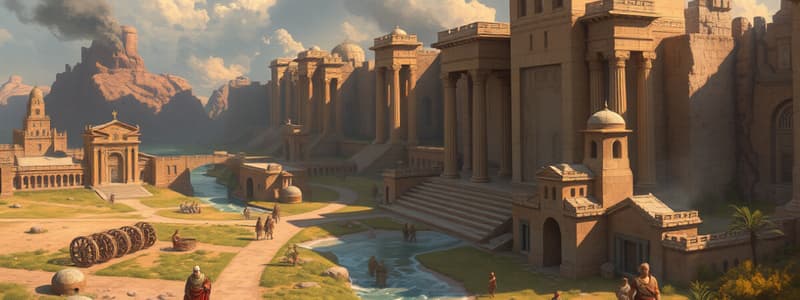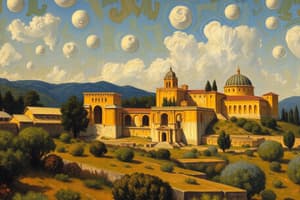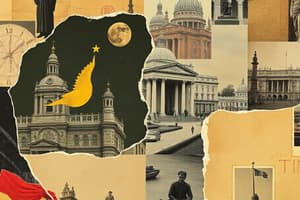Podcast
Questions and Answers
What marks the beginning of Ancient History?
What marks the beginning of Ancient History?
- The invention of writing (correct)
- The invention of the wheel
- The establishment of agriculture
- The discovery of fire
Which methodology involves the examination of historical texts and records?
Which methodology involves the examination of historical texts and records?
- Fieldwork
- Archival Research
- Documentary Analysis (correct)
- Oral History
Which of the following civilizations is part of Ancient History?
Which of the following civilizations is part of Ancient History?
- Byzantine Empire
- Indus Valley (correct)
- Modern European States
- Mongol Empire
What characterizes the Middle Ages in history?
What characterizes the Middle Ages in history?
What is 'Historiography'?
What is 'Historiography'?
Which figure is known as a leader of the Indian independence movement?
Which figure is known as a leader of the Indian independence movement?
What concept analyzes the factors that lead to events in history?
What concept analyzes the factors that lead to events in history?
Which theme in history focuses on the dynamics of governance and authority?
Which theme in history focuses on the dynamics of governance and authority?
Flashcards are hidden until you start studying
Study Notes
Overview of History
- Definition: The study of past events, particularly in human affairs.
- Purpose: Understanding human behavior, societal changes, and the development of civilizations.
Divisions of History
-
Prehistory
- Time before written records.
- Studied through archaeology and anthropology.
-
Ancient History
- Begins with the invention of writing (c. 3500 BCE).
- Key civilizations: Mesopotamia, Ancient Egypt, Indus Valley, Ancient China, Mesoamerica.
-
Classical History
- Focus on major empires: Greece and Rome.
- Development of philosophy, democracy, and structured governance.
-
Middle Ages
- Roughly 500-1500 CE.
- Feudalism, the rise of Islam, and the Byzantine Empire.
-
Modern History
- Post-Middle Ages (1500 CE onwards).
- Key periods: Renaissance, Enlightenment, Industrial Revolution, and contemporary era.
Key Historical Concepts
-
Historiography: The study of how history is written and interpreted.
-
Primary vs. Secondary Sources:
- Primary: Original documents, artifacts (e.g., diaries, letters).
- Secondary: Interpretations or analyses based on primary sources (e.g., textbooks, articles).
-
Causation: Understanding why events happen (e.g., political, economic, social factors).
-
Change and Continuity: Analyzing what changes over time and what remains the same.
Major Themes in History
- Power and Politics: The dynamics of governance, authority, and revolutions.
- Culture and Society: How culture, beliefs, and social structures evolve.
- Economics: Trade, labor systems, and the impact of industrialization.
- Conflict and Cooperation: Wars, treaties, and alliances throughout history.
Important Historical Figures
- Alexander the Great: Conqueror who created a vast empire.
- Julius Caesar: Roman general and statesman pivotal in the transition from Republic to Empire.
- Genghis Khan: Founder of the Mongol Empire, known for military prowess.
- Mahatma Gandhi: Leader of the Indian independence movement advocating non-violent resistance.
Methodologies in Historical Research
- Archaeology: Study of physical remains to understand past societies.
- Documentary Analysis: Examination of historical texts and records.
- Oral History: Gathering and analyzing spoken accounts from individuals.
Importance of History
- Cultural Identity: Understanding heritage and cultural legacies.
- Lessons Learned: Learning from past mistakes and successes.
- Informed Citizenship: Encouraging participation in contemporary social and political matters.
Overview of History
- Definition encompasses the examination of past events, especially in relation to human activities.
- The study aims to comprehend human behavior, societal transformations, and civilization development.
Divisions of History
- Prehistory: Period before the advent of writing; investigated through archaeological and anthropological methods.
- Ancient History: Begins around 3500 BCE with writing; significant civilizations include Mesopotamia, Ancient Egypt, Indus Valley, Ancient China, and Mesoamerica.
- Classical History: Focuses on empires such as Greece and Rome; notable for advancements in philosophy, democracy, and governance structures.
- Middle Ages: Spanning approximately 500 to 1500 CE; characterized by feudal systems, the emergence of Islam, and the prominence of the Byzantine Empire.
- Modern History: Starts after the Middle Ages in 1500 CE; marked by the Renaissance, Enlightenment, Industrial Revolution, and contemporary developments.
Key Historical Concepts
- Historiography: Involves the analysis of how history is recorded and interpreted.
- Primary Sources: Original artifacts or documents like diaries and letters that provide direct evidence.
- Secondary Sources: Interpretative works such as textbooks and articles derived from primary sources.
- Causation: Analysis of factors leading to historical events, including political, economic, and social influences.
- Change and Continuity: Examines what evolves over time and what remains unchanged.
Major Themes in History
- Power and Politics: Investigates governance dynamics, authority issues, and revolutions.
- Culture and Society: Studies the evolution of beliefs, culture, and social frameworks.
- Economics: Explores trade, labor systems, and the effects of industrialization on societies.
- Conflict and Cooperation: Chronicles wars, peace treaties, and alliances across different historical periods.
Important Historical Figures
- Alexander the Great: Noted for his conquests and the establishment of a vast empire.
- Julius Caesar: Key figure in the Roman transition from Republic to Empire through military and political strategies.
- Genghis Khan: Renowned for founding the Mongol Empire and demonstrated exceptional military capabilities.
- Mahatma Gandhi: Advocated for non-violent resistance during the Indian independence movement.
Methodologies in Historical Research
- Archaeology: Analyzes physical artifacts to uncover insights about past civilizations.
- Documentary Analysis: Involves evaluating historical texts and records for information.
- Oral History: Collects and studies spoken narratives from individuals to capture personal and communal histories.
Importance of History
- Cultural Identity: Enhances understanding of heritage and the legacies of cultures.
- Lessons Learned: Provides insights to avoid past errors and replicate successes.
- Informed Citizenship: Promotes active engagement in current social and political issues based on historical understanding.
Studying That Suits You
Use AI to generate personalized quizzes and flashcards to suit your learning preferences.




